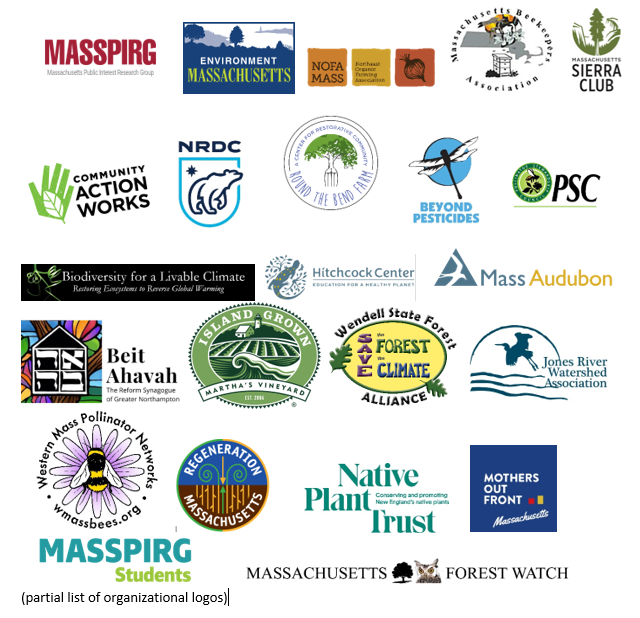Deirdre Cummings
Legislative Director, MASSPIRG
617-747-4319
[email protected]
Legislative Director, MASSPIRG
617-747-4319
[email protected]
Fifty organizations called on the Massachusetts Department of Agriculture to protect pollinators and restirct the use of neonicotinoids, a pesticishown to be harmful to pollintors. The letter appears below.

Commissioner John Lebeaux
Massachusetts Department of Agriculture
Chairman Michael Moore
Chairman, Pesticide Board
February 10, 2021
Dear Commissioner Lebeaux and Chairman Moore,
We are writing to urge your swift action in restricting the use of pollinator-harming neonicotinoid pesticides and to ask for greater transparency in this regulatory process.
As you know, the Massachusetts Department of Agriculture released a compelling literature review outlining the harmful impacts of neonicotinoid insecticides for a public hearing on March 13, 2020. At that time a coalition of beekeepers, public health, farming and agriculture and environmental organizations praised the findings of the report and called for swift action to protect bees and native pollinators. That hearing was postponed until December 10, 2020, where more than 100 people were in attendance. A coalition of over 55 agricultural, climate and pollinator advocacy groups, farms and businesses, along with several individuals submitted testimony for at hearing urging the Department to take the following actions:
-Ban the use of neonicotinoids by unlicensed individuals.
-Ban the use of neonicotinoid-coated corn and soybean seeds.
-Prohibit applications of all neonicotinoid products on bee-attractive crop plants during bloom
-Require labeling of plants and plant materials that have been treated with neonicotinoids.
-Stop the use of neonicotinoids on state and local property.
-Significantly increase buffer zones for use near waterways.
-Ban aesthetic-only uses of neonicotinoids.
-Track the use of all neonicotinoid applications within the Commonwealth.
-Ban any other uses the Department deems to cause unreasonable adverse effects on the environment or pollinators.
On January 18, 2021 the Pesticide Board Subcommittee reported they would be considering one or more motions relative to neonicotinoids and MDAR at their meeting on February 16th, 2021. Given the compelling findings of the department’s review regarding the environmental harm of these pesticides, we hope to see the adoption of meaningful restrictions on the use of neonicotinoids.
We understand that Department staff have been charged with drafting motions to be considered, and possibly voted on, by the Subcommittee at their February meeting. We are asking you to confirm if this is the case, and if so, to provide, by the morning of Monday, February 15th, the content of these motions and any other related materials prepared for the board to consider in advance of the meeting. We would like a clear understanding of the content, context, and timeline of the motions relative to the neonicotinoid pesticides which will be considered before the Pesticide Board, the Subcommittee, or other board within the Department of Agriculture.
As we begin the next growing season, we are reminded again of our reliance on pollinators. Your own study revealed overwhelming evidence in its scientific literature review that neonicotinoid insecticides are harming pollinators. The research found that nearly all of the impact-based studies reviewed (42 of 43) cited “neonics” as a contributor to pollinator declines, and pointed out that the only study with mixed results was industry-funded.
The evidence is clear, and there is broad public support for significantly restricting the use of these dangerous pesticides which are harming pollinators. Please take action, without delay.
We look forward to hearing from you on this important matter.
Sincerely,
Deirdre Cummings, MASSPIRG
Marty Dagoberto, NOFA/MASS
Ben Hellerstein, Environment Massachusetts
Clint Richmond, Sierra Club Massachusetts
Mary Duane, Massachusetts Beekeepers Association
Evan Abramson, Landscape Interactions
Leonore Alaniz, Wendell State Forest Alliance
Casey Beebe, Hitchcock Center for the Environment
Mireille Bejjani, Community Action Works
Lori Ann Burd, Center for Biological Diversity
Janet Cason, 350 Central MA
Madeleine Charney, Mothers Out Front
John Cohen, Wendell State Forest
Pine duBois, Jones River Watershed Association, Inc.
Debbi Edelstein, Native Plant Trust
Erin Rupp, Pollinator Stewardship Council
Laurel Facey, Wendell State Forest Alliance
Ellen Fine, Community Equitability Group- Resiliency Gardens Project, Healthy Ya, Healthy Yards
Needham, Pollinator Protectors
Charles Flammer, Elders Climate Action
Anna Hanchett, Plainfield Agricultural Commission
Rabbi Riqi Kosovske, Beit Ahavah Reform Synagogue
Peggy MacLeod, W. Mass Pollinator Networks
Jill Malcolm, Garden Club Federation of Massachusetts
Chris Matera, Massachusetts Forest Watch
Janice McPhillips, Friends of Holly Hill Farm, Inc.
Amy Meltzer, Grow Native MA
Pat Neary, Bridgewater Green Committee
Rebecca Neimark, Hitchcock Center for the Environment
Anne O’Connor, Williamstown Select Board
Don Ogden, The Enviro Show
Paula Phipps, Biodiversity for a Livable Climate
Tony Pisano, Berkshire Farms Apiary
Daniel Raichel, Natural Resources Defense Council
Heidi Ricci, Mass Audubon
Angela Roell, They Keep Bees
John Root, Western Mass Pollinator Networks
Ginger Ryan, Mothers Out Front Massachusetts
MeKenna Sellito, MASSPIRG Students
Bridget Spann, Caretaker Farm, 1210 Hancock Road
Ed Stockman, Regeneration Massachusetts
Darcy Sweeney, Climate Action Now, Western Mass.
Noli Taylor, Island Grown Initiative
Aemelia Thompson, Hitchcock Center for Environmental Education
James Thornley, Wendell State Forest Alliance
Drew Toher, Beyond Pesticides
Desa VanLaarhoven, Round the Bend Farm; a Center for Restorative Community,
Owen Wormser, Local Harmony
Clifford Youse, Plymouth County Beekeepers’ Association
Pat Neary, Bridgewater Green Committee
cc:
Secretary Kathleen Theoharides
Executive Office of Energy and Environmental Affairs
Taryn LaScola